A recent study from researchers at the University of California, Riverside, in collaboration with the UCLA Center for Health Policy Research’s Native Hawaiian and Pacific Islander Data Policy Lab, and UC Irvine, reveals that many eligible Native Hawaiians and Pacific Islanders (NHPIs) in California faced significant mental health and economic hardships during the COVID-19 pandemic. The report, which analyzed survey data from over 900 NHPI adults in 2024, highlighted the barriers these communities encountered in accessing mental health care and food assistance.
The findings indicate that approximately one-third of NHPI respondents reported needing mental health care in 2023. However, many did not pursue the help they required due to various obstacles, including high costs, lack of insurance, social stigma, and difficulty finding providers. Andrew Subica, an associate professor at UC Riverside and co-author of the report, stated, “Despite facing substantial mental health challenges, only a small percentage of NHPI adults sought mental health care.”
The stress experienced by these individuals largely stemmed from health fears, financial instability, and concerns for family members, particularly elders. On a positive note, many participants reported coping strategies that included support from friends and family, spiritual practices, engaging in family activities, and increased screen time.
Economically, the pandemic had a profound impact, with over one-third of NHPI adults indicating a decline in household income since its onset. Specific subgroups, such as Fijians and Marshallese, experienced even greater difficulties. The survey revealed that nearly 14% of respondents lost their jobs, while more than 25% struggled to afford basic necessities like rent, food, and tuition.
Despite the availability of programs like Medi-Cal and CalFresh, fewer than one-third of eligible individuals accessed these benefits. Historically, NHPIs have often been categorized with the broader Asian American group in social and health data, which obscures the unique challenges they face. For instance, NHPIs in California have a lower average per capita income compared to their Asian American counterparts.
The report emphasizes the importance of collecting disaggregated data to better understand the distinct mental health outcomes and economic struggles of different NHPI subgroups. Subica noted, “Our findings underline the necessity for equitable resource distribution and informed policymaking that addresses the specific needs of NHPI communities.”
The researchers attribute the successful completion of the study to strong engagement with the NHPI community, which is essential for ensuring that resources are distributed fairly and effectively among these populations.



